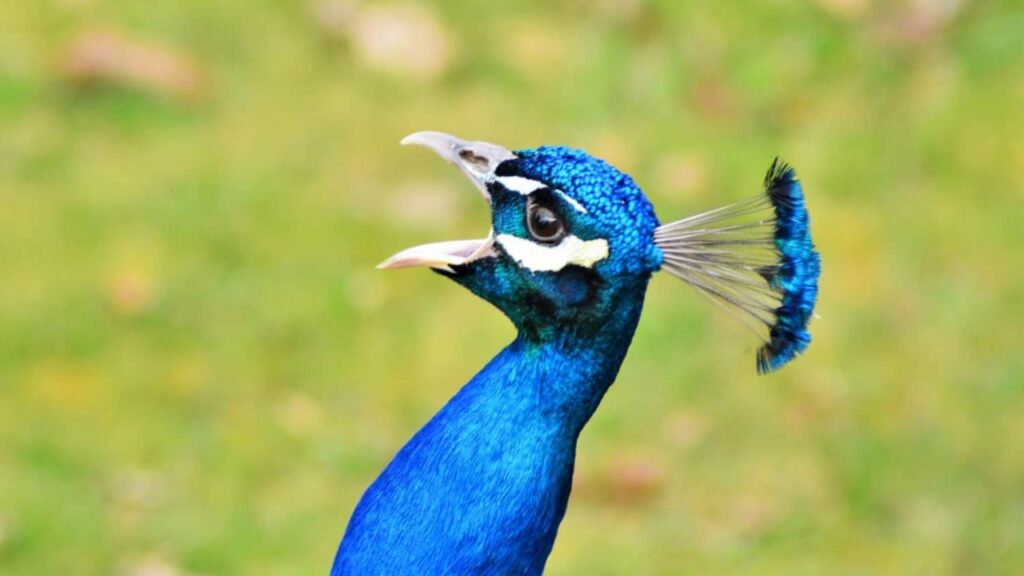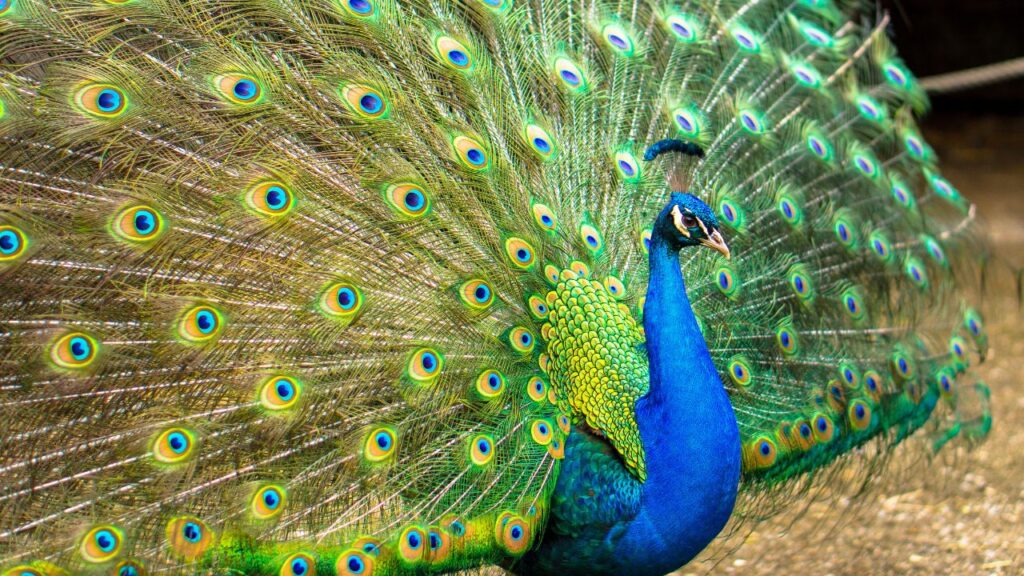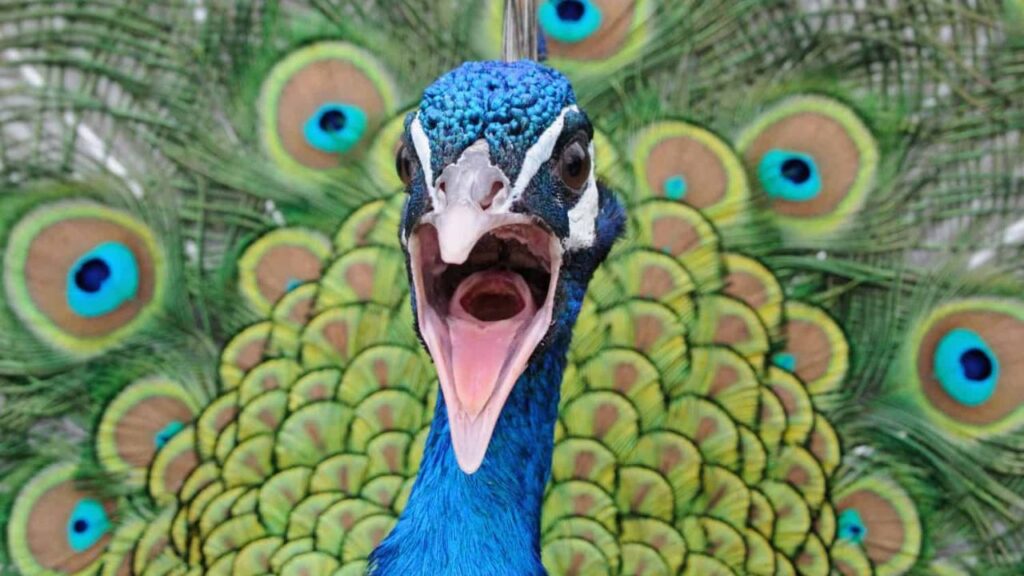Do Peacocks Attack Humans? Peacocks can attack humans, especially when they feel threatened or are protecting their territory.
Peacocks, renowned for their vibrant plumage and captivating displays, are often seen as majestic and peaceful creatures.
However, an intriguing question arises: Do peacocks attack humans? This post delves into the circumstances under which peacocks might become aggressive and provides insight into their behavior.
Peacocks, despite their serene appearance, can display surprising aggression under certain conditions.
Understanding these conditions can help prevent dangerous encounters and ensure a harmonious coexistence with these magnificent birds.
Contents
Who Are Peacocks?
Peacocks, or peafowls, belong to the pheasant family and are native to the Indian subcontinent, with three primary species: the Indian Peafowl, the Green Peafowl, and the Congo Peafowl.
Known for their iridescent feathers and elaborate courtship displays, these birds inhabit forests and open grasslands.
While male peacocks are celebrated for their striking appearance, females, called peahens, are more subdued in color but equally significant in understanding peafowl behavior.
The Indian Peafowl (Pavo cristatus) is the most commonly known species and is the national bird of India. [Do Peacocks Attack Humans?]
Males, or peacocks, are famous for their vibrant, eye-spotted tail feathers, which they fan out during courtship displays.
Peahens, on the other hand, have more muted brown and green plumage, providing camouflage while nesting.
The Green Peafowl (Pavo muticus) is native to Southeast Asia and is known for its green and gold feathers. This species is considered endangered due to habitat loss and hunting.
The Congo Peafowl (Afropavo congensis) is found in the rainforests of the Congo Basin in Africa.
This species is less colorful than its Asian counterparts but is equally fascinating due to its unique habitat and behaviors.

Peacock Aggression: When and Why
Protective Behavior
Peacocks exhibit protective behavior, particularly when guarding their nests and young. [Do Peacocks Attack Humans?]
They perceive any encroachment near their nesting area as a threat and may respond aggressively to ensure the safety of their eggs or chicks.
This behavior is crucial for the survival of their offspring. Peahens, in particular, are known to attack if they feel their chicks are in danger, using their sharp beaks and claws to ward off intruders.
Peacocks’ protective instincts extend beyond their immediate nesting area. They may attack if they feel their territory is being invaded or if they are cornered and unable to escape.
Understanding these behaviors can help people avoid unintentionally provoking these birds.
Territorial Nature
Peacocks are territorial birds, often defending their space vigorously.
When humans or other animals invade their territory, peacocks might feel threatened and resort to aggressive displays or attacks to protect their domain.
This territorial instinct is more pronounced during the breeding season. [Do Peacocks Attack Humans?]
During breeding season, males establish territories that they defend against rivals. These territories often include resources such as food, water, and nesting sites.
Intrusions by other peacocks or animals can trigger aggressive behavior as males strive to maintain control over their area.
Mating Season
During the mating season, peacocks display increased aggression. Males, in particular, become more vigilant and protective as they try to attract mates.
Their displays, involving the fanning of their tail feathers and loud calls, are both a courtship ritual and a warning to potential threats.
The heightened aggression during this period is driven by the need to secure a mate and ensure the continuation of their genetic line.
Peacocks’ mating displays are not only intended to attract females but also to intimidate rivals. The sight of a fully fanned tail, combined with vocalizations, signals to other males that this territory is claimed.
Approaching a displaying male too closely can provoke an attack, as the peacock perceives the intruder as a threat to its reproductive success.
See Also: Do Ostriches Attack Humans? The Shocking Truth!

Documented Cases of Peacock Attacks
There have been several documented cases where peacocks have attacked humans. These incidents often occur in zoos, parks, or private properties where peafowls are kept.
For example, there have been reports of peacocks attacking children in zoos, leading to injuries that sometimes require medical attention.
These cases highlight the importance of maintaining a respectful distance from these birds, especially in settings where they roam freely.
One notable incident occurred in 2021 at a zoo in Salt Lake City, Utah, where a peacock attacked four children, resulting in one being hospitalized.
The attack was prompted by the children getting too close to the bird, which felt threatened and responded aggressively.
Similar incidents have been reported in other zoos and parks, emphasizing the need for awareness and caution around peafowls.
In 2016, a two-year-old boy was attacked by a peacock in a park in Orlando, Florida. The peacock jumped onto the boy’s head, causing injuries that required stitches.
Such incidents demonstrate that peacocks can pose a risk, particularly to small children, who may unknowingly provoke the birds.

How Dangerous Are Peacocks?
Potential for Harm
Peacocks have sharp beaks and talons that they use when attacking. While their beaks can cause painful pecks, their talons can scratch deeply, leading to significant injuries.
The level of harm depends on the force and location of the attack, with facial injuries being particularly severe.
Children are more vulnerable to peacock attacks due to their smaller size and playful behavior, which can be perceived as a threat by the birds.
Can They Kill Humans?
Although peacock attacks can cause serious injuries, fatal attacks are extremely rare. There has been one reported case where a peacock attack led to a fatality, but such instances are anomalies.
Generally, peacocks do not have the physical strength to kill a human, but they can inflict painful wounds.
The case of a man in Thailand who died after being attacked by his pet peacock is an exception rather than the norm.
The man suffered severe head injuries that led to a coma and subsequent death, highlighting the potential dangers of keeping these birds as pets.
Peacocks’ beaks and talons, while sharp, are not designed for causing fatal injuries to humans. [Do Peacocks Attack Humans?]
However, their attacks can still result in significant harm, especially if the bird targets vulnerable areas such as the face or neck.
It is crucial to take precautions and avoid provoking these birds to minimize the risk of serious injury.

Safety Tips: Avoiding Peacock Attacks
Recognizing Warning Signs
Peacocks exhibit specific behaviors when they feel threatened or are about to attack. [Do Peacocks Attack Humans?]
These include raising their feathers, making loud calls, and staring intensely. Recognizing these signs can help you avoid an aggressive encounter.
Peacocks may also charge or lunge at perceived threats, using their beaks and talons to defend themselves. If you notice a peacock exhibiting these behaviors, it is best to back away slowly and avoid making sudden movements.
Dos and Don’ts
- Avoid making eye contact or sudden movements, as these can be seen as challenges.
- Slowly back away if a peacock shows signs of aggression, maintaining a calm demeanor.
- Do not try to touch or feed wild peacocks, as this can provoke them. Feeding peacocks can lead to them associating humans with food, increasing the likelihood of aggressive behavior if they feel deprived.
Emergency Response
If a peacock attacks you:
- Stay calm and avoid panicking, as this can escalate the situation.
- Use your arms or an object to shield your face and head, protecting vulnerable areas from pecks and scratches.
- Seek medical attention if you sustain injuries, as peacock scratches and pecks can lead to infections. Clean any wounds thoroughly and apply antiseptic to prevent infection.
Frequently Asked Questions (FAQs)
Can peacocks be kept as pets?
While some people keep peacocks as pets, they require significant space and care. Peafowls are not domesticated animals and can be aggressive, especially if they feel threatened or are not properly cared for. Owners must provide ample space for the birds to roam and ensure they have a safe environment. Regular veterinary care is also essential to maintain their health.
Are peacocks dangerous to other animals?
Peacocks can be aggressive towards smaller animals that encroach on their territory. However, larger animals like goats and sheep are generally safe around them. Peacocks may attack smaller animals such as cats or dogs if they feel threatened or if the animals get too close to their nests. It is important to monitor interactions between peacocks and other animals to prevent conflicts.
What should you do if you encounter an aggressive peacock in the wild?
Avoid making eye contact, back away slowly, and use an object to shield yourself if necessary. Do not run or make sudden movements, as this can provoke further aggression. If a peacock charges at you, try to put a barrier between yourself and the bird, such as a tree or a large object. If you are in a public space, seek assistance from park or zoo staff.
Do peacocks attack during the mating season?
Yes, peacocks are more aggressive during the mating season as they are protective of their space and mates. It’s best to keep a safe distance from them during this period. Male peacocks, in particular, are more likely to exhibit territorial and protective behaviors during this time. Observing their displays from a distance can help avoid provoking an attack.
How can you prevent peacock attacks if you live near them?
Maintain a respectful distance, do not feed or try to touch them, and secure any areas where they might nest to avoid accidental encounters. Providing ample space for the birds and avoiding interference with their activities can help reduce the likelihood of aggressive behavior. If you have children or pets, supervise their interactions with peacocks to ensure their safety.
Conclusion: Do Peacocks Attack Humans?
Understanding peacock behavior is key to preventing aggressive encounters.
While these birds are generally peaceful, their protective and territorial instincts can lead to attacks under certain circumstances.
By respecting their space, avoiding provocative actions, and recognizing warning signs, humans can coexist safely with these magnificent creatures.
Awareness and caution are essential when interacting with peafowls, ensuring both human safety and the well-being of these beautiful birds.

Hello, I am Rosa Ellis, a mother of two and a wildlife blogger. I grew up in New York City, but I love exploring forests. I’ve traveled to places like Yellowstone National Park and the Amazon Rainforest to see animals up close. I know a lot about animal behavior and which animals can be dangerous to humans. Thanks for visiting my blog!

